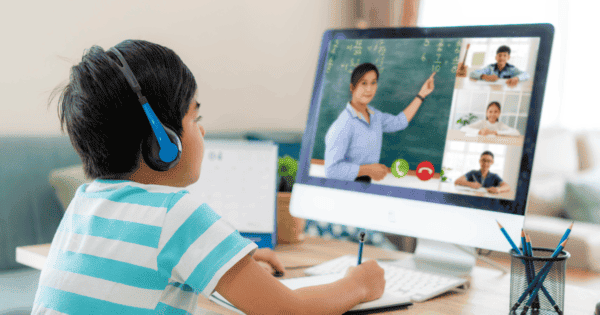With remote live lessons still in place for many, Psychologist Dr Linda Papadopoulos shares practical tips for parents with kids experiencing issues with it, and SWGfL (South West Grid for Learning) launch a social media campaign to raise awareness about young people’s mental health when remote learning during lockdown.
Internet Matters survey parents
As schools across the UK reopen, our new survey reveals both the positive and negative impact remote learning has had on children’s wellbeing and self-esteem.
The survey* asked parents whether having their camera on during live lessons has affected their children’s mental health. While the majority of parents (46%) agreed that live lessons gave their children an opportunity to remain ‘visibly connected’, four out of 10 (41%) said they had made their child more self-conscious about their identity and how they look on camera.
In addition, 43% said their child found it hard to speak up during live lessons and 37% said they were more anxious than normal when asked to attend with their camera on.
Dr Linda on remote learning
With remote live lessons likely to stay in place for many pupils for some time, we launched a series of videos with Dr Linda Papadopoulos who gives expert advice on how to support your children if they are finding it hard to have their camera on during live lessons.
The videos target parents of both primary and secondary school age, focusing on what positive steps they can take from helping them manage any anxieties they have to deal with individual issues.
SWGfL on remote learning
SWGfL (South West Grid for Learning) is also launching a social media campaign for children aged 13 – 18 letting them know that they are not alone in the issues they have faced during lockdown and remote learning. They collaborated with Priory Learning Trust and Headstart Kernow and interviewed over 600 pupils who agreed that tech can be a blessing but can also present a number of wellbeing issues. The campaign shares the lockdown experiences of a group of children and the innovative ways in which they are coping.
The majority agreed that whilst it’s been great in enabling them to stay connected and keep up with school work, they have become so reliant on the tech that they can sometimes feel tied down to it. The Instagram campaign will present short videos where 13 – 18-year olds talk about how they cope with the everyday stresses of lockdown learning and raise awareness of what young people can do to support their mental health.
Stats and figures
The survey also looked into what parents thought the legacy of home-schooling would be:
- Over half (52%) said they were worried about the long-term impact online learning will have on their children’s confidence and self-esteem
- Nearly four out of 10 (39%) wanting more help on how to deal with it
Online safety was also a growing concern for parents as a result of lockdown – as
- over half (53%) want schools to teach children more about it and 47% said they need more help with it themselves
- increased screen time was another concern as over half (52%) of parents said they are worried about the amount of time their child has to spend on digital devices each day due to lockdown.
Lasting thoughts
Carolyn Bunting, CEO of Internet Matters, said: “It’s understandable that parents may be worried about the long-term impact of lockdown on their children and many might be confused about what is beneficial for them and what might be causing them distress.
“What’s clear is we need to accept technology will play an even bigger role in children’s everyday school life including remote live lessons.
“We’re pleased to be able to offer help and support through the resources on our website including some new videos which tackle how to support your child if having a camera on during lessons is causing them any anxiety.”
Dr Linda Papadopoulos said: “Right now, it’s understandable that parents will be worried about the impact of remote learning on their kids, especially when it comes to video lessons. But there are many positive steps they can take to help.
“For younger children, it’s about managing the basics, ensuring they can see and hear well and keeping them engaged with support from the school.
“When it comes to older children, they are much more socially aware, so it’s important to help them manage any anxieties and individual issues they have, not letting them feel like they are more exposed during online lessons than they usually are.
“It’s also about reinforcing the idea that this is a moment in time that’s affected us all, but it doesn’t have to be something that affects who we are, it’s temporary.”
David Wright, Director of UK Safer Internet Centre, said: “Tech has ensured young people can continue to learn, socialise and communicate during this third lockdown – however, we know there are many issues that they have faced along the way.
“Through our survey, we found that many children are facing the same struggles whether that’s issues with having their camera on during live remote lessons to concerns over being too reliant on tech.
“What’s important is that children know they are not alone in the issues they have faced and can feel a sense of achievement as they look to head back to the classroom for the first time this year.”
To watch Dr Linda Papadopoulos video series and learn more about online safety and how to support your child, head to www.internetmatters.org/remote-learning-tips.
To follow the SWGfL Instagram campaign head to www.instagram.com/swgfl_official
*Research commissioned by Internet Matters of 2,001 UK adults of which 497 were parents via Opinium.





